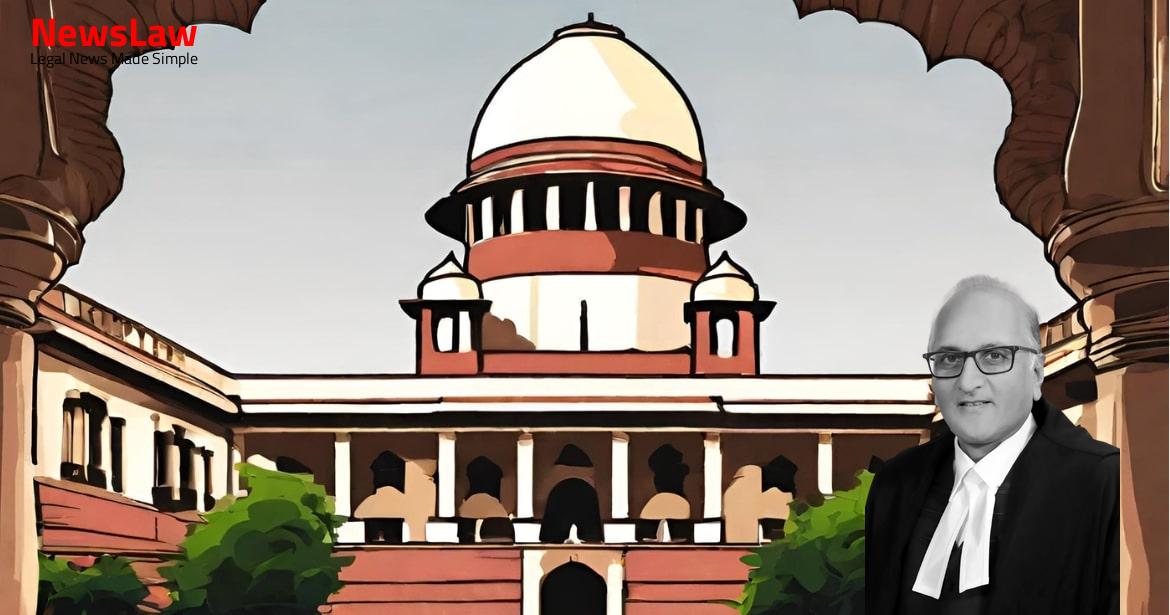Exploring the complexities of succession rights in wakf deeds, the Supreme Court of India recently ruled in the case of Nazira Khatoon v. Mutawalli Board. The judgment delves into the interpretation of the wakf deed provisions and their impact on the appointment of mutawallis. Discover the legal intricacies and implications in this significant case.
Facts
- Abdur Rahim created a wakf in 1913 appointing Syed Obaidullah Baghdadi as the original mutawalli.
- The wakf deed provided for the office of the mutawalli to devolve to male lineal descendants.
- The Wakf Board appointed Nazira Khatoon as mutawalli, which was challenged by Gyasuddin Ahmed’s grandson.
- The Wakf Board canceled Nazira Khatoon’s appointment based on the original wakf deed.
- Gyasuddin Ahmed’s grandson was held entitled to the office of mutawalli.
- The High Court’s decision of 2008 set aside the Wakf Tribunal’s order.
- Syed Obaidullah Baghdadi founded a khankhah for religious education, leading to the appointment disputes.
- The term ‘putro poutradi krome’ in the wakf deed was interpreted for succession to sons and grandsons.
- Syed Badruddin Ahmed appointed Nazira Khatoon as mutawalli in 1995.
- The Wakf Board’s power to review its decision was disputed.
- Last mutawalli’s son was authorized to act as sajjadanashin according to the will.
- Nazira Khatoon did not qualify to be the mutawalli of the wakf estate.
- The original wakf deed was given utmost importance in the decision.
- Cancellation of Nazira Khatoon’s initial appointment was considered a review and set aside.
- The trust deed created by the last mutawalli in favor of his wife was not given effect.
- A mutawalli does not have the authority to transfer their rights in the wakf independently.
Also Read: Tower Infotech Ltd. Bail Order Appeal
Issue
- The issue at hand is whether a mutawalli can transfer his office to another person through a trust deed, when a wakf deed already establishes a specific line of succession for the office.
- The key question is whether the mutawalli’s ability to transfer the office through a trust deed supersedes the predetermined line of succession outlined in the wakf deed.
- This raises concerns about the legal validity and implications of such a transfer, considering the existing wakf deed and its provisions.
- The court needs to determine the validity and enforceability of the mutawalli’s attempt to transfer his office through a trust deed in light of the wakf deed’s provisions.
Also Read: Priority of Employees’ Dues in Asset Sale: SARFAESI Act vs. Land Revenue Code
Arguments
- Term ‘putro poutradi’ explained as ‘son and descendants’.
- Dev’s Bengali-to-English Dictionary used to define ‘putro poutradi’ as future generations, posterity, or descendants.
- The term is gender-neutral, applicable to both male and female descendants.
- Wife of the last mutawalli, Nazira Kharoon, eligible to be mutawalli under the wakf deed.
- Appellant has the right to be appointed as mutawalli.
Also Read: Landmark Judgement on Consumer Rights in Healthcare Sector
Analysis
- The term ‘putro poutradi krome’ in the wakf deed indicates succession from generation to generation of male descendants.
- The original intent of the wakif was to restrict the mutawalliship to male descendants only.
- The appointment of Nazira Khatoon as mutawalli was wrongful and against the express terms of the wakf deed.
- The right to sue does not survive in the legal representatives of Nazira Khatoon as she passed away during the pendency of the case.
- The translation provided by the petitioner interpreting ‘putro poutradi krome’ as ‘through successive generations or successors’ is not accepted.
- The official translation of ‘putro poutradi krome’ refers to future generations or descendants.
- The word ‘putro’ within ‘putro poutradi krome’ specifically means son and grandson, excluding female descendants from mutawalliship.
- The succession of mutawalli should align with the wakif’s intention, preventing subversion through other documents.
- The transfer of mutawalli office through a trust deed by the last mutawalli exceeded his powers as per the wakf deed and Mohammedan law principles.
- A mutawalli does not have the authority to assign or transfer his office unless explicitly granted in the wakf deed, which is not the case here.
- The creation of the trust deed to favor female descendants is tantamount to altering the original terms of the wakf deed.
- Once a wakf is created, all rights of property pass from the Wakif to the Almighty, and the Mutawalli has no rights in the wakf property
- The Mutawalli’s role is that of a superintendent or manager, not a trustee in the technical sense
- The Mutawalli cannot mortgage, sell, or exchange wakf property without court permission unless specifically empowered by the wakf deed
- The transfer of the Mutawalli’s office during their lifetime is generally not allowed in Muhammadan Law unless expressly provided for in the wakf deed
- The Mutawalli cannot transfer their office to another person unless explicitly allowed by the founder in the wakf deed
Decision
- High Court of Calcutta decision dated 01.10.2008 upheld
- Cancellation of Nazira Khatoon’s appointment as permanent mutawalli of the wakf estate affirmed
- Impugned decision in revisional application CO No 936 of 2006 upheld
- Instant appeal dismissed
Case Title: SYEDA NAZIRA KHATOON (D) BY LR. Vs. SYED ZAHIRUDDIN AHMED BAGHDADI AND OTHERS
Case Number: C.A. No.-004045-004045 / 2010



